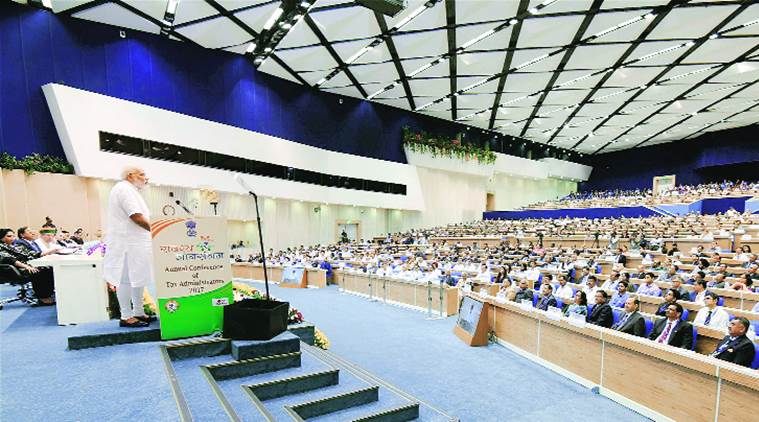PM Modi to taxmen: Use data analytics to track undeclared income, wealth

BY : News Gateway / Business-Economy/ New Delhi /
Honest cannot continue to pay the price for the misdeeds of the dishonest, says PM Modi
Highlighting the need to strengthen data analytics and investigation wing of the tax department, Prime Minister Narendra Modion Friday asked tax officers to use data analytical tools to proactively track and determine undeclared income and wealth. Modi, in his address to tax officials on the first day of the two-day annual conference of tax administrators, Rajaswa Gyan Sangam, also emphasised that the honest taxpayers cannot continue to pay the price for the misdeeds of the dishonest and that tax officers need to come up with a time-bound solution for ‘tax raised and not realised’.
“The Prime Minister asked officers to use data analytical tools to proactively track and determine undeclared income and wealth. He said that though efforts to increase tax revenue are made by officers each year, the estimated amounts of tax that should accrue to the system, are often not realised. The Prime Minister asked officers to come up with a time-bound solution to ‘tax raised and not realised’, and asserted that the honest cannot continue to pay the price for the misdeeds of the dishonest,” a Prime Minister’s Office release quoted him as saying.
“In this regard he also suggested complete reworking of human resource management in the tax departments to strengthen the data analytics and investigation wing,” it added. On the new indirect tax regime of Goods and Services Tax (GST), which was rolled out from July 1 this year, Modi said that the tax department should work towards designing a system for ensuring registration of all traders, including even relatively smaller traders with a turnover below Rs 20 lakh, with the GST system. Under GST, any person whose aggregate turnover in a financial year exceeds the threshold limit of Rs 20 lakh (Rs 10 lakh for hilly and north-eastern states) shall be liable to obtain registration.
Enlisting the benefits of GST, Modi said that the new indirect tax regime has ensured transparency in the system and economic integration of the country and more than 17 lakh new traders have been brought into the indirect tax system within two months. The Central Board of Excise and Customs (CBEC) in a series of tweets said that PM Modi appreciated the efforts put in by Central and state officials for smooth implementation of the GST regime and “desired that the benefit of GST should percolate to the common man”.
CBEC also said that the issues and concerns faced during GST implementation are being shared and discussed in the conference on a common platform. Modi also said that there is a need to eliminate pendency of tax-related cases in adjudication and appeal. “Prime Minister Narendra Modi expressed his dismay at the huge pendency of tax-related cases in adjudication and appeal. He said big sums of money that is locked up in these cases, could have been used for the welfare of the poor. He asked officers to come up with an action plan during the Rajaswa Gyan Sangam, to eliminate pendency,” the release said.
The Prime Minister said human interface must be kept to a minimum in the tax administration’s dealings and a push should be given to “e-assessment” and anonymity of proceedings using technology, so that vested interests do not impede the due course of law, the release said. The Prime Minister exhorted the officers to improve their work-culture, to incorporate both a “sense of urgency”, and “measurability”, in their performance and to fix clear targets to improve the country’s tax administration by 2022.
Modi said that the government is working towards creation of an environment which shatters the confidence of the corrupt and instills confidence and trust among the honest taxpayers, mentioned steps taken such as demonetisation and implementation of laws against black money and benami property.
This is the second edition of Rajaswa Gyan Sangam, the joint conference of tax officials from the Central Board of Direct Taxes (CBDT) and CBEC and participation of tax officials from states and union territories for the first time.